The Man Who Wasn’t There (Joel Coen) 2001
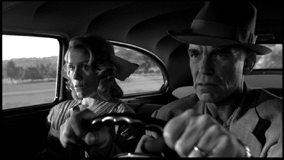 The opening shot of the Coen brothers’ The Man Who
Wasn’t There shows a barber’s pole as it hypnotically spins around. The
film seems to be lulling us gently into its slower-paced, black and white world.
The circularity and steadiness of that image manage to say a lot about
what’s to come, and especially about the film’s lead. The film centers on Ed
Crane (Billy Bob Thorton), a man of few words that works as a second-string
barber. Frank (Michael Badalucco), his blabbermouth brother-in-law, owns the
shop, and that’s fine by Ed. Ed seems to be contentedly coasting through his
quiet life with his wife, Doris (Frances McDormand) an accountant who “liked
knowing where everything stood” and aspires to eventual middle-management. We
come to find that Ed doesn’t know where everything stands. His wife is having
an affair with “Big Dave” (James Gandolfini), her boss, though it’s not
long before Ed suspects it. Ed isn’t one to make a fuss, however. He doesn’t
give much credence to his hunch, even when he learns his wife’s boss is about
to make her the manager of his next department store. However, once Creighton
Tolliver (Jon Polito), a seemingly sleazy businessman makes his way into his
barber’s chair, things change. Creighton pitches the idea of opening a
dry-cleaning business that intrigues Ed, and fills him with a yearning for more
than his life provides. Since he needs $10,000 to become a “silent partner”
in the dry-cleaning operation, he anonymously blackmails Big Dave, threatening
to reveal the affair if he does not receive that sum.
The opening shot of the Coen brothers’ The Man Who
Wasn’t There shows a barber’s pole as it hypnotically spins around. The
film seems to be lulling us gently into its slower-paced, black and white world.
The circularity and steadiness of that image manage to say a lot about
what’s to come, and especially about the film’s lead. The film centers on Ed
Crane (Billy Bob Thorton), a man of few words that works as a second-string
barber. Frank (Michael Badalucco), his blabbermouth brother-in-law, owns the
shop, and that’s fine by Ed. Ed seems to be contentedly coasting through his
quiet life with his wife, Doris (Frances McDormand) an accountant who “liked
knowing where everything stood” and aspires to eventual middle-management. We
come to find that Ed doesn’t know where everything stands. His wife is having
an affair with “Big Dave” (James Gandolfini), her boss, though it’s not
long before Ed suspects it. Ed isn’t one to make a fuss, however. He doesn’t
give much credence to his hunch, even when he learns his wife’s boss is about
to make her the manager of his next department store. However, once Creighton
Tolliver (Jon Polito), a seemingly sleazy businessman makes his way into his
barber’s chair, things change. Creighton pitches the idea of opening a
dry-cleaning business that intrigues Ed, and fills him with a yearning for more
than his life provides. Since he needs $10,000 to become a “silent partner”
in the dry-cleaning operation, he anonymously blackmails Big Dave, threatening
to reveal the affair if he does not receive that sum.
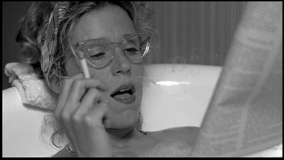 The plot, as such, is fairly representative of film noir
traditions, and the proceedings definitely feel inspired by stuff like Double
Indemnity. Still, the Coens are after a bit more than a simple recreation of
a genre. The film isn't so much a character study of a repressed man as an
evisceration of the American Dream (the same theme as in Hudsucker &
Lebowski -- my other favorite Coen flicks). All of the characters here get into
trouble once they attempt to live that dream. The clearest evocation of this
theme hilariously makes reference to The Godfather, which is probably
cinema’s definitive examination of the American Dream gone wrong. Doris and Ed
attend an Italian wedding that parodies the one that opened Coppola’s work.
Frank is exposed as the consumer that he is when he wins a pie-eating contest
(with a full stomach!). When one of Doris’ relatives asks Ed why he and his
wife haven’t yet had kids, they are being chastised for not producing more.
The film’s world is definitely comprised of “haves” (Riedenschnieder,
Mrs. Nirdlinger, Carconogues) and “have-nots” (the Cranes, Big Dave, Frank,
Tolliver). By trying to be entrepreneurs, the have-nots end up in ruin. We see
Big Dave, a have-not, as he imports expensive cigars and spins tales of wartime
horrors (which are the only acceptable horrors in the film’s world) in order
to gain acceptance. Frank lectures Ed on the similarities between them and the
men that run things, but it feels like a lie. The system is shown as it
literally feeds off the toil of the have-nots. It always demands more payment
for the hubris that Ed displays. His sin is his desire to be more than he is,
and the punishment starts with “working for the bank”, and results in the
loss of everything. The film’s mention of a UFO cover-up isn’t the only lie
that the government wants the characters to believe. The notion that upward
mobility exists in America seems just as much an illusion as the resemblance of
a hubcap to a flying saucer.
The plot, as such, is fairly representative of film noir
traditions, and the proceedings definitely feel inspired by stuff like Double
Indemnity. Still, the Coens are after a bit more than a simple recreation of
a genre. The film isn't so much a character study of a repressed man as an
evisceration of the American Dream (the same theme as in Hudsucker &
Lebowski -- my other favorite Coen flicks). All of the characters here get into
trouble once they attempt to live that dream. The clearest evocation of this
theme hilariously makes reference to The Godfather, which is probably
cinema’s definitive examination of the American Dream gone wrong. Doris and Ed
attend an Italian wedding that parodies the one that opened Coppola’s work.
Frank is exposed as the consumer that he is when he wins a pie-eating contest
(with a full stomach!). When one of Doris’ relatives asks Ed why he and his
wife haven’t yet had kids, they are being chastised for not producing more.
The film’s world is definitely comprised of “haves” (Riedenschnieder,
Mrs. Nirdlinger, Carconogues) and “have-nots” (the Cranes, Big Dave, Frank,
Tolliver). By trying to be entrepreneurs, the have-nots end up in ruin. We see
Big Dave, a have-not, as he imports expensive cigars and spins tales of wartime
horrors (which are the only acceptable horrors in the film’s world) in order
to gain acceptance. Frank lectures Ed on the similarities between them and the
men that run things, but it feels like a lie. The system is shown as it
literally feeds off the toil of the have-nots. It always demands more payment
for the hubris that Ed displays. His sin is his desire to be more than he is,
and the punishment starts with “working for the bank”, and results in the
loss of everything. The film’s mention of a UFO cover-up isn’t the only lie
that the government wants the characters to believe. The notion that upward
mobility exists in America seems just as much an illusion as the resemblance of
a hubcap to a flying saucer.
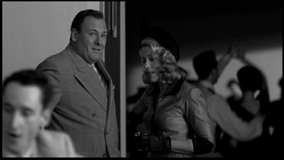 The film clearly identifies itself as a critique of
narrative traditions when Ed’s narration is revealed to be a submission to a
pulpy men’s magazine. The lines between a society and the stories that society
creates seem to be blurred here (a trial is referred to as “the big show”).
The film is attacking the world that created the necessarily subversive nature
of film noir. Ed is an astonishingly repressed lead character, and when he
discovers his wife is cheating on him, he can only say that it “pinched a
little.” When his lawyer describes him as “the modern man”, we understand
that his repression is shared by the film’s society. We discover one character
is homosexual, and see that this repression takes on many forms.
Another way the film attacks noirish repression is through it’s choice
of the first crime that Ed commits. Tellingly, it’s blackmail. Blackmail only
works if there is a truth that is being obscured. Since Big Ed is hiding his
affair from his wife (who owns the department store), he is vulnerable to that
blackmailing. Since affairs are so socially unacceptable in the film’s world,
the crime fits the setting while it extends the sense of oppression. When one
character offers another oral sex, the world literally spins out of control,
unable to contain the concept of such deviance. Interestingly, the film’s
characters do not repress their racism, showing that changes in social mores are
not a one-way street. Although it was somewhat socially acceptable for Doris to
complain, “I hate wops” in that era, it would be definitely frowned upon
today.
The film clearly identifies itself as a critique of
narrative traditions when Ed’s narration is revealed to be a submission to a
pulpy men’s magazine. The lines between a society and the stories that society
creates seem to be blurred here (a trial is referred to as “the big show”).
The film is attacking the world that created the necessarily subversive nature
of film noir. Ed is an astonishingly repressed lead character, and when he
discovers his wife is cheating on him, he can only say that it “pinched a
little.” When his lawyer describes him as “the modern man”, we understand
that his repression is shared by the film’s society. We discover one character
is homosexual, and see that this repression takes on many forms.
Another way the film attacks noirish repression is through it’s choice
of the first crime that Ed commits. Tellingly, it’s blackmail. Blackmail only
works if there is a truth that is being obscured. Since Big Ed is hiding his
affair from his wife (who owns the department store), he is vulnerable to that
blackmailing. Since affairs are so socially unacceptable in the film’s world,
the crime fits the setting while it extends the sense of oppression. When one
character offers another oral sex, the world literally spins out of control,
unable to contain the concept of such deviance. Interestingly, the film’s
characters do not repress their racism, showing that changes in social mores are
not a one-way street. Although it was somewhat socially acceptable for Doris to
complain, “I hate wops” in that era, it would be definitely frowned upon
today.
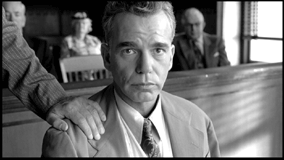 The film’s strong message is ultimately hurt, by its
abundance of self-reference. The constant need of the filmmakers to call
attention to the film’s reactionary stance to the film noir tradition takes
its toll on our emotional involvement to the film’s events, as do some of the
self-referential remarks (e.g. “We were entertaining…”) in Ed’s
narration. A lot of the Coen-cuteness gets in the way of what they're saying
(e.g. Big Dave’s a haberdasher at Nerdlinger’s), and it's almost as if the
filmmakers don't care if most of the audience exits the film thinking they just
saw a comedy. And Billy Bob is too much a cipher in this role for my taste...
he's not underplaying, he's almost playing nothing (there are a few moments
where his observations have profound sadness behind them, however).
The film’s strong message is ultimately hurt, by its
abundance of self-reference. The constant need of the filmmakers to call
attention to the film’s reactionary stance to the film noir tradition takes
its toll on our emotional involvement to the film’s events, as do some of the
self-referential remarks (e.g. “We were entertaining…”) in Ed’s
narration. A lot of the Coen-cuteness gets in the way of what they're saying
(e.g. Big Dave’s a haberdasher at Nerdlinger’s), and it's almost as if the
filmmakers don't care if most of the audience exits the film thinking they just
saw a comedy. And Billy Bob is too much a cipher in this role for my taste...
he's not underplaying, he's almost playing nothing (there are a few moments
where his observations have profound sadness behind them, however).
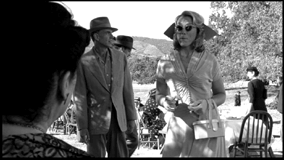 Some of the themes on display here seem to be present in
many of the Coens’ other works. Certainly grotesque characters populate the
world, as in all of the Coens’ films, but a lot of the film ultimately centers
on Ed’s obsession with cleanliness. “Dry cleaning… Was I crazy to be
thinking about it?” he wonders. He sees the dry-cleaning as his fresh start,
and his ticket out of his life. He claims not thinking about it is what has kept
him locked up. We see many shots such as the ones that show Ed sweeping up hair,
or freshly shaven stubble as it floats in water. That obsessive-compulsive
streak is prevalent in other Coen films. Certainly, all of their films have such
pristine art direction that there seems to be nothing accidental in their
compositions, but consider their lead character’s general craving for neatness
and order. In The Big Lebowski, The Dude’s driven by his desire to get
a clean rug. O Brother, Where Art Thou?’s Ulysses is a confirmed
“Dapper Dan Man”, risking life and limb to ensure neat hair. Many of the
most horrifying sequences in their films show blood as it dirties an
environment, be it a blanket of white snow (Fargo), a literal blanket (Barton
Fink), or a car seat (Blood Simple). The singular onscreen killing in
The Man… is allowed to be relatively neat by comparison to those in
their other films, since the need for cleanliness manifests itself in other ways
here.
Some of the themes on display here seem to be present in
many of the Coens’ other works. Certainly grotesque characters populate the
world, as in all of the Coens’ films, but a lot of the film ultimately centers
on Ed’s obsession with cleanliness. “Dry cleaning… Was I crazy to be
thinking about it?” he wonders. He sees the dry-cleaning as his fresh start,
and his ticket out of his life. He claims not thinking about it is what has kept
him locked up. We see many shots such as the ones that show Ed sweeping up hair,
or freshly shaven stubble as it floats in water. That obsessive-compulsive
streak is prevalent in other Coen films. Certainly, all of their films have such
pristine art direction that there seems to be nothing accidental in their
compositions, but consider their lead character’s general craving for neatness
and order. In The Big Lebowski, The Dude’s driven by his desire to get
a clean rug. O Brother, Where Art Thou?’s Ulysses is a confirmed
“Dapper Dan Man”, risking life and limb to ensure neat hair. Many of the
most horrifying sequences in their films show blood as it dirties an
environment, be it a blanket of white snow (Fargo), a literal blanket (Barton
Fink), or a car seat (Blood Simple). The singular onscreen killing in
The Man… is allowed to be relatively neat by comparison to those in
their other films, since the need for cleanliness manifests itself in other ways
here.
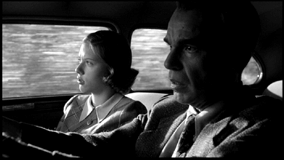 Most distressing is the film’s decision to make Ed such a
blank slate. The film’s title can read to imply Ed is stupid (he isn’t all
there). We’re never really certain whether Ed is just exceptionally detached
or if he’s dumb. His obsession with Birdy (Scarlett Johansson), the young
daughter of one of his friends, seems to be sexual, but also seems to be founded
by Ed’s desperate attempt to recognize genius. When he needs professional
help, he always hires the best. It’s almost as if all of his apprehensiveness
and non-action stems from a lack of confidence in his own intelligence, or
decisions. The film criticizes his character for falling for the idea of an
American dream. It leaves him with no understanding of the way things work, and
only a bit of optimism that he will one day gain that insight. Still, it
doesn’t look hopeful. Mrs. Nirdlinger tells Ed that “sometimes knowledge is
a curse”, and the film seems to agree. The truth is obscured in this world,
and she hopes that an ongoing police investigation will “bring it out
finally”. We’re subjected to a
speech that espouses the uncertainty principle, which basically states, that the
longer you look at something, the less you’ll know about it. This film isn’t
much of a riddle to us, but to Ed, with his unwavering belief in the system, it
seems it will remain that way. It’s profoundly sad, yet telling, when the
film’s last image of Ed and Doris shows them at the receiving end of a sales
pitch. Small moments like these resonate throughout the picture, making The
Man Who Wasn’t There one of the Coens' most successful, emotionally
charged works.
Most distressing is the film’s decision to make Ed such a
blank slate. The film’s title can read to imply Ed is stupid (he isn’t all
there). We’re never really certain whether Ed is just exceptionally detached
or if he’s dumb. His obsession with Birdy (Scarlett Johansson), the young
daughter of one of his friends, seems to be sexual, but also seems to be founded
by Ed’s desperate attempt to recognize genius. When he needs professional
help, he always hires the best. It’s almost as if all of his apprehensiveness
and non-action stems from a lack of confidence in his own intelligence, or
decisions. The film criticizes his character for falling for the idea of an
American dream. It leaves him with no understanding of the way things work, and
only a bit of optimism that he will one day gain that insight. Still, it
doesn’t look hopeful. Mrs. Nirdlinger tells Ed that “sometimes knowledge is
a curse”, and the film seems to agree. The truth is obscured in this world,
and she hopes that an ongoing police investigation will “bring it out
finally”. We’re subjected to a
speech that espouses the uncertainty principle, which basically states, that the
longer you look at something, the less you’ll know about it. This film isn’t
much of a riddle to us, but to Ed, with his unwavering belief in the system, it
seems it will remain that way. It’s profoundly sad, yet telling, when the
film’s last image of Ed and Doris shows them at the receiving end of a sales
pitch. Small moments like these resonate throughout the picture, making The
Man Who Wasn’t There one of the Coens' most successful, emotionally
charged works.
* * * 1/2
October, 2001
Jeremy Heilman